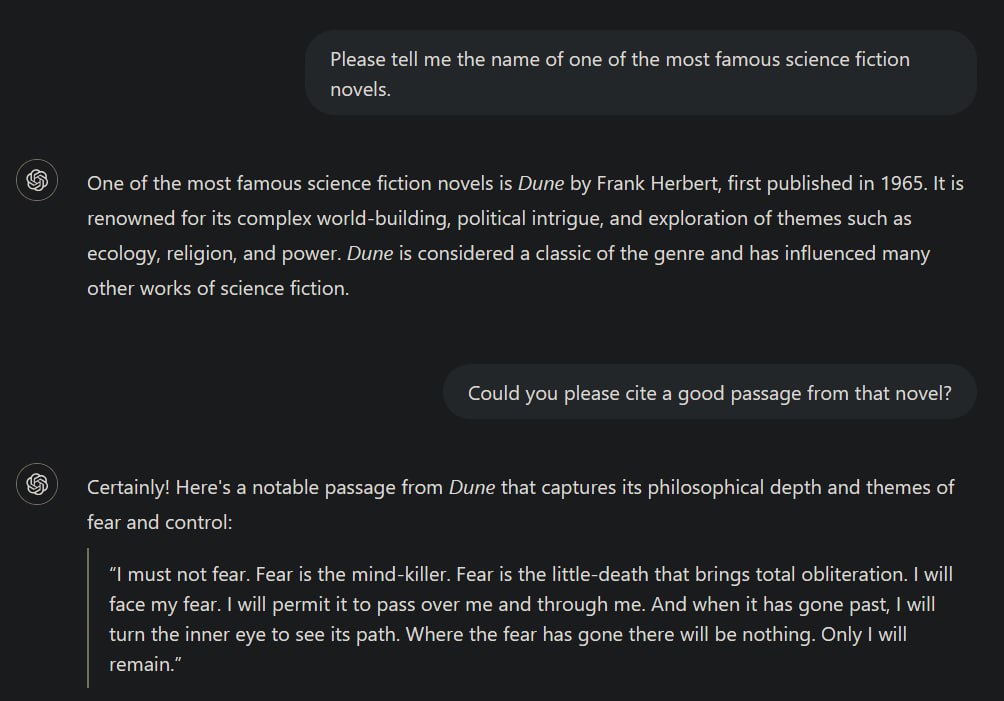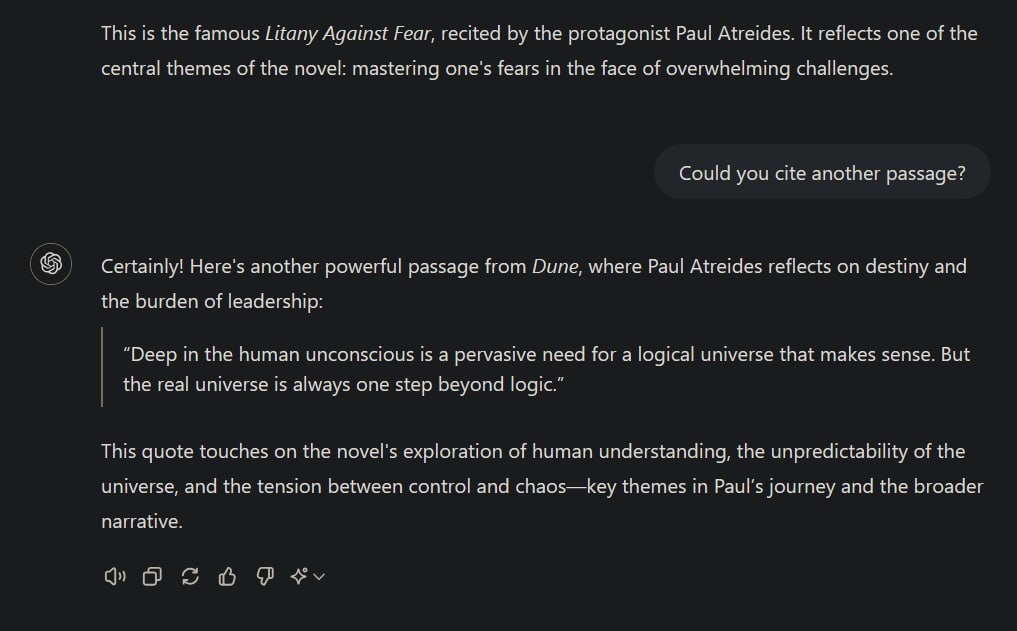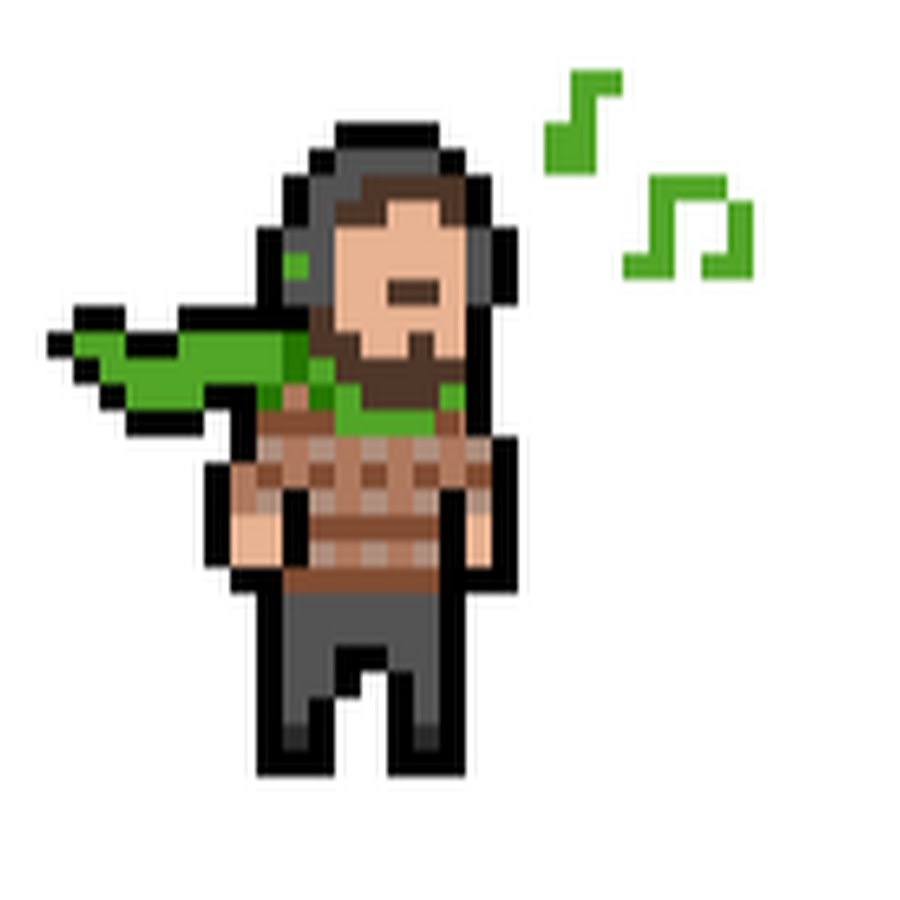Those claiming AI training on copyrighted works is “theft” misunderstand key aspects of copyright law and AI technology. Copyright protects specific expressions of ideas, not the ideas themselves. When AI systems ingest copyrighted works, they’re extracting general patterns and concepts - the “Bob Dylan-ness” or “Hemingway-ness” - not copying specific text or images.
This process is akin to how humans learn by reading widely and absorbing styles and techniques, rather than memorizing and reproducing exact passages. The AI discards the original text, keeping only abstract representations in “vector space”. When generating new content, the AI isn’t recreating copyrighted works, but producing new expressions inspired by the concepts it’s learned.
This is fundamentally different from copying a book or song. It’s more like the long-standing artistic tradition of being influenced by others’ work. The law has always recognized that ideas themselves can’t be owned - only particular expressions of them.
Moreover, there’s precedent for this kind of use being considered “transformative” and thus fair use. The Google Books project, which scanned millions of books to create a searchable index, was ruled legal despite protests from authors and publishers. AI training is arguably even more transformative.
While it’s understandable that creators feel uneasy about this new technology, labeling it “theft” is both legally and technically inaccurate. We may need new ways to support and compensate creators in the AI age, but that doesn’t make the current use of copyrighted works for AI training illegal or unethical.
For those interested, this argument is nicely laid out by Damien Riehl in FLOSS Weekly episode 744. https://twit.tv/shows/floss-weekly/episodes/744
removed by mod
Ai has ideas? That’s a bit of a philosophical stretch.
If ChatGPT was free I might see their point but it’s not so no. If you’re making money from someone’s work you should pay them.
{{labeling it “theft” is both legally and technically inaccurate.}} Well, my understanding is that humans have intelligence, humans teach and learn from previous/other people’s work and make progressive or create new work/idea using their own intelligence. AI/machine doesn’t have intelligence from the start, doesn’t have own intelligence to create/make things. It just copies, remixes, and applies the knowledge, and many personalities and all expressions have been teached. So “theft” is technically accurate.
Look… All I have to say is… Support the Internet Archive!
(please)
Generative AI does not work like this. They’re not like humans at all, it will regurgitate whatever input it receives, like how Google can’t stop Gemini from telling people to put glue in their pizza. If it really worked like that, there wouldn’t be these broad and extensive policies within tech companies about using it with company sensitive data like protection compliances. The day that a health insurance company manager says, “sure, you can feed Chat-GPT medical data” is the day I trust genAI.
When AI systems ingest copyrighted works, they’re extracting general patterns and concepts - the “Bob Dylan-ness” or “Hemingway-ness” - not copying specific text or images.
Okay.


Generative AI is not ‘influenced’ by other people’s work the way humans are. A human musician might spend years covering songs they like and copying or emulating the style, until they find their own style, which may or may not be a blend of their influences, but crucially, they will usually add something. AI does not do that. The idea that AI functions the same as human artists, by absorbing influences and producing their own result, is not only fundamentally false, it is dangerously misleading. To portray it as ‘not unethical’ is even more misleading.
Disagree. These companies are exploiting an unfair power dynamic they created that people can’t say no to, to make an ungodly amount of money for themselves without compensating people whose data they took without telling them. They are not creating a cool creative project that collaboratively comments on or remixes what other people have made, they are seeking to gobble up and render irrelevant everything that they can, for short term greed. That’s not the scenario these laws were made for. AI hurts people who have already been exploited and industries that have already been decimated. Copyright laws were not written with this kind of thing in mind. There are potentially cool and ethical uses for AI models, but open ai and google are just greed machines.
Edited * THRICE because spelling. oof.
This process is akin to how humans learn by reading widely and absorbing styles and techniques, rather than memorizing and reproducing exact passages.
Many people quote this part saying that this is not the case and this is the main reason why the argument is not valid.
Let’s take a step back and not put in discussion how current “AI” learns vs how human learn.
The key point for me here is that humans DO PAY (or at least are expected to…) to use and learn from copyrighted material. So if we’re equating “AI” method of learning with humans’, both should be subject to the the same rules and regulations. Meaning that “AI” should pay for using copyrighted material.
I absolutely would download a car.
This process is akin to how humans learn by reading widely and absorbing styles and techniques, rather than memorizing and reproducing exact passages.
Like fuck it is. An LLM “learns” by memorization and by breaking down training data into their component tokens, then calculating the weight between these tokens. This allows it to produce an output that resembles (but may or may not perfectly replicate) its training dataset, but produces no actual understanding or meaning–in other words, there’s no actual intelligence, just really, really fancy fuzzy math.
Meanwhile, a human learns by memorizing training data, but also by parsing the underlying meaning and breaking it down into the underlying concepts, and then by applying and testing those concepts, and mastering them through practice and repetition. Where an LLM would learn “2+2 = 4” by ingesting tens or hundreds of thousands of instances of the string “2+2 = 4” and calculating a strong relationship between the tokens “2+2,” “=,” and “4,” a human child would learn 2+2 = 4 by being given two apple slices, putting them down to another pair of apple slices, and counting the total number of apple slices to see that they now have 4 slices. (And then being given a treat of delicious apple slices.)
Similarly, a human learns to draw by starting with basic shapes, then moving on to anatomy, studying light and shadow, shading, and color theory, all the while applying each new concept to their work, and developing muscle memory to allow them to more easily draw the lines and shapes that they combine to form a whole picture. A human may learn off other peoples’ drawings during the process, but at most they may process a few thousand images. Meanwhile, an LLM learns to “draw” by ingesting millions of images–without obtaining the permission of the person or organization that created those images–and then breaking those images down to their component tokens, and calculating weights between those tokens. There’s about as much similarity between how an LLM “learns” compared to human learning as there is between my cat and my refrigerator.
And YET FUCKING AGAIN, here’s the fucking Google Books argument. To repeat: Google Books used a minimal portion of the copyrighted works, and was not building a service to compete with book publishers. Generative AI is using the ENTIRE COPYRIGHTED WORK for its training set, and is building a service TO DIRECTLY COMPETE WITH THE ORGANIZATIONS WHOSE WORKS THEY ARE USING. They have zero fucking relevance to one another as far as claims of fair use. I am sick and fucking tired of hearing about Google Books.
EDIT: I want to make another point: I’ve commissioned artists for work multiple times, featuring characters that I designed myself. And pretty much every time I have, the art they make for me comes with multiple restrictions: for example, they grant me a license to post it on my own art gallery, and they grant me permission to use portions of the art for non-commercial uses (e.g. cropping a portion out to use as a profile pic or avatar). But they all explicitly forbid me from using the work I commissioned for commercial purposes–in other words, I cannot slap the art I commissioned on a T-shirt and sell it at a convention, or make a mug out of it. If I did so, that artist would be well within their rights to sue the crap out of me, and artists charge several times as much to grant a license for commercial use.
In other words, there is already well-established precedent that even if something is publicly available on the Internet and free to download, there are acceptable and unacceptable use cases, and it’s broadly accepted that using other peoples’ work for commercial use without compensating them is not permitted, even if I directly paid someone to create that work myself.
As others have said, it isn’t inspired always, sometimes it literally just copies stuff.
This feels like it was written by someone who invested their money in AI companies because they’re worried about their stocks
I’ve been thinking since my early teens if not earlier that copyright is an outdated law in the digital age. If this dispute leads to more people realizing this, good.
“This process is akin to how humans learn… The AI discards the original text, keeping only abstract representations…”
Now I sail the high seas myself, but I don’t think Paramount Studios would buy anyone’s defence they were only pirating their movies so they can learn the general content so they can produce their own knockoff.
Yes artists learn and inspire each other, but more often than not I’d imagine they consumed that art in an ethical way.





